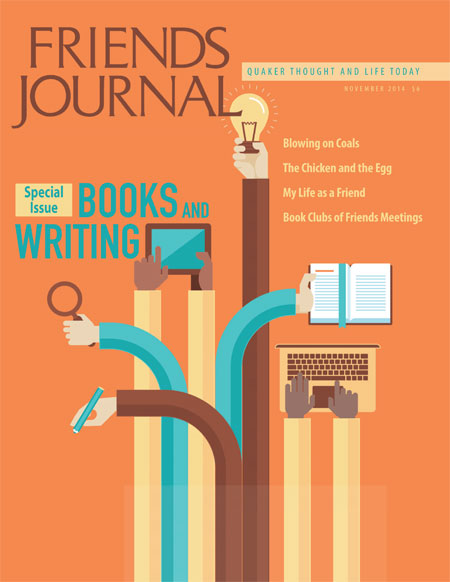
A poet I know was once asked where she got her ideas. She said, “Well, I think of it like there’s a chicken in my brain laying eggs. And every now and then, it lays a good one.”
I like the earthy humility of that image. A chicken is a homely and useful creature. A good egg, properly cooked, is perfectly delicious and nourishing; or, fertilized and kept warm, it produces another chicken. Tossed into the compost pile, the empty shells carry calcium back out into the world for the birds and the snails.
Eggs are democratic. A dozen eggs from a friend with a backyard chicken coop is a precious gift when money is tight, but when you’re flush, the pastry chef at the fancy restaurant down the road can serve you a soufflé that is a work of art. My mother, born on a subsistence farm in the depths of the Great Depression, went out barefoot in the morning to collect fresh-laid eggs, and might have sat down later to a scrambled-egg supper very much like the one her president, Franklin Delano Roosevelt, was eating.
Some writers are ablaze with ambition. John Milton, you will recall, thought he could write a poem that would “justify the ways of God to man.” Gertrude Stein declared herself a genius and wanted to create an entirely new kind of literature for the twentieth century, doing with words what artists like Picasso and Matisse were doing with paint. David Foster Wallace once wrote to his editor, “I want to author things that both restructure worlds and make living people feel stuff.” Make people feel stuff, sure. But restructure worlds? That’s a tall order.
Ambitions like these do not hang heavy upon me. My work tends to be small in length, in subject matter, and in audience. I rarely write anything as long as a thousand words, and although I do post things on my blog and write for publication elsewhere from time to time, I very often write for audiences as small as a single beloved person. I used to want to be a genius, to remake literature, and change the world; to take on heaven, hell, angels, and God as my subject matter. I used to think that to measure my output in hundreds of pages rather than hundreds of words, and to strain always for greatness, was the only way to be a writer.
Now I know better. I have a chicken in my brain. That’s my gift. My chicken pecks up everything from grit to grains to nourishing bugs, and it makes my writing as modest and democratic and perfect as an egg.
Footnotes in a Box
*Note: I can actually footnote the FDR scrambled-egg thing. I don’t think Friends Journal does footnotes, but in case anyone wonders: Yes, I looked it up! Imagine my embarrassment if I’d sat him down to an egg only to find out later he had an allergy. Cannon, Poppy, and Patricia Brooks. The Presidents’ Cookbook: Practical Recipes from George Washington to the President. New York: Funk & Wagnalls, 1968. p. 436.
*I can also footnote the DFW quote. And that would be appropriate. Because, you know, David Foster Wallace, footnotes, it’s a thing. D. T. Max. “The Unfinished: David Foster Wallace’s struggle to surpass Infinite Jest.” The New Yorker, March 9, 2009.
*But the Gertrude Stein thing is just a piece of general knowledge, assuming your general knowledge includes the work and life of Gertrude Stein. I was an English major and a lesbian, so mine does.
*Gertrude Stein was always bringing people home for dinner. If Alice B. Toklas liked them, she made them omelets. But if she didn’t like them, she made them scrambled eggs. The cost was the same, but the difference in effort was a subtle indicator of her feelings. This is one egg-and-writing related story I wasn’t able to work into this essay, but I have always liked it. This is the only thing I remember from reading The Autobiography of Alice B. Toklas, a book written by Gertrude, 25 years ago.





Nice article, but I found the picture disturbing
Martin said I could add things in the comments, so I want to add the one thing I wish I’d included: when FDR ate scrambled eggs for supper, it was Eleanor who cooked them. They were a usual dinner on Sundays, the White House cook’s day off. No word on FDR’s position on the home fries/hash browns issue.